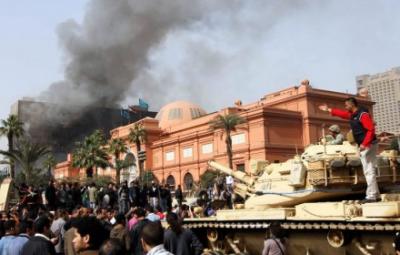Egyptologists speak out
Don't believe the scare stories: ordinary Egyptians have protected precious antiquities.
Revolutions call for radical change - are Western museums and archaeologists ready for this? Or might they, like their governments, prefer business as usual?
The racism and intolerance in reactions abroad to the safeguarding of antiquities in the 25 January revolution are provocative and insulting. In the fight for freedom and for rights taken for granted in some countries, at least 350 young Egyptians gave their lives, and hundreds more have been injured in ways that will mark them for life. In this fight, people from all sectors of society also physically risked their lives to protect museums and sites from attack. Yet, panic reports on looting in western media and archaeology blogs were followed by widespread surprise that the scale had been exaggerated, and that people fought back - a story that never received the full press attention it deserved. In Cairo people defended the museums, in Alexandria students ringed the Library and in Upper Egypt villagers protected Karnak temple. From our own friends and colleagues we have heard extraordinary tales of courage - of inspectors trying to see off armed attackers at stores, of curators walking miles across the city, through streets reverberating with gunfire, to join museum guards. When the police disappeared from the streets, ordinary Egyptians defended themselves and the archaeology.
This defence seems to have caused surprise abroad, but the fact that even well-disposed foreigners have been taken aback is a great insult. The Egyptian reply? "This is the Egypt that you do not know and do not see, and do not want to see - and you will continue repeating your error."
People often say that Egyptian heritage is world heritage, and this may be true, but it is also particularly Egyptian heritage: we did not see the world represented by non-Egyptian archaeologists or bodies of tourists in those cordons. Instead, the pictures of human cordons defending museums demonstrate how, against the expectations of foreigners, it means more to Egyptians. Unlike the most famous museums in the west, the museums of Egypt house the national heritage of the country itself, the pride of a nation that sees itself as teacher of the world - and will be seen as such again, following the 25 January revolution.
Here are some radical proposals:
- Besides returning regime assets to Egypt, the outside world should also end its involvement in illegal antiquities smuggling - the largest global trafficking crisis, alongside drugs and arms. Egypt can secure its heritage in its own way within its own borders, and has all the experts it needs in conservation and historical knowledge. Outside pressure needs to end. Western governments should end practices that promote looting: they should close free-zone airport warehouses stockpiled with stolen antiquities, and tmake it illegal to sell or buy undocumented antiquities. Antiquities are looted around the world only where there is a market for them, where they can be smuggled out and sold. The international community has to play a role in removing this appalling pressure on Egypt's national heritage.
- Requests from Egypt for the return of antiquities should be honoured. Even before 25 January, several museums had returned items, or started talks about loans of masterpieces for exhibitions - something unheard of in previous decades. The revolution offers the chance to transform the relations between countries on these issues. Any request should be welcomed from a land that has risked so much to save its museums. Western organisations can also invite Egyptian participation in discussions over the continual movements of Egyptian antiquities, in such initiatives as the UK "Effective Collections" scheme.
- A third radical move would be a shift towards an Egyptian archaeology, where "Egyptian" means both by Egyptians and in Egypt. The main initiative in this area will come from the revolutionary demand for education funding to reinvigorate universities and scientific research. In archaeology, international missions already contribute to survey and excavation training for Egyptians. Yet, at present, Egypt hosts dozens of foreign archaeological missions from countries that do not host, and would never contemplate hosting, an Egyptian mission of any kind. The late Ottoman Period "concession" is still the technical term for foreign work on an Egyptian site. This imbalance is produced in part by the technological revolution in western archaeology. Besides a massive carbon footprint, this has given world archaeology a rationale for neo-colonial exclusion: minimal participation of Egyptian scholars in non-Egyptian teams has widened the gap between local and foreign. Building on the best existing initiatives, a new Egypt may bring more collaborative work, where foreign missions no longer talk of "their" sites, and where, instead, foreign archaeology in Egypt will mean co-directed teams comprised of equal numbers of Egyptians and foreigners. In the future, Egyptian archaeology will be as Egyptian as English archaeology is English.
Dedicated to the martyrs of the 25 January revolution.
Comment by Fayza Haikal, Stephen Quirke, Okasha El Daly, William Carruthers, Marwa Helmy, Nikolaos Laziridis and Karen Exell, in The New Statesman, 07/03/11
- Συνδεθείτε για να υποβάλετε σχόλια
 Εκτυπώσιμη μορφή
Εκτυπώσιμη μορφή- Send by email

